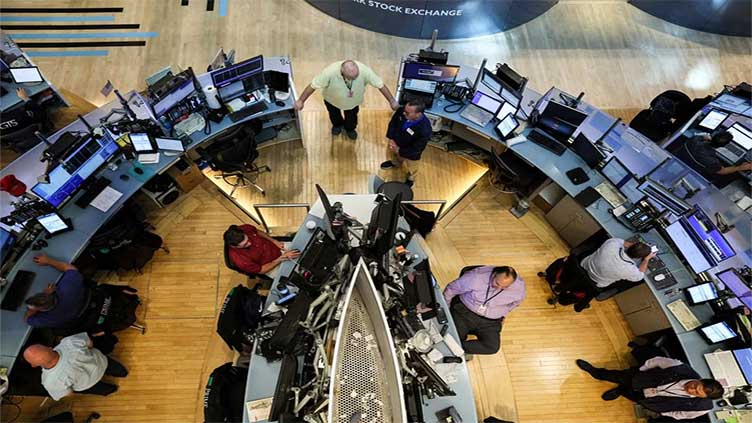Wall Street drifts modestly lower before the bell; CVS rises, Snap tumbles

Business
Wall Street drifts modestly lower before the bell; CVS rises, Snap tumbles
NEW YORK (AP) Wall Street drifted lower before the opening bell Wednesday in another week packed with corporate earnings.
Futures for the S&P 500 inched down less than 0.1% before the bell and futures for the Dow Jones Industrial Average slipped 0.2%.
With little in the way of economic data releases this week, the focus is on corporate earnings, which have been mixed.
CVS Health rose about 1.7% in premarket trading after its adjusted profit and revenue beat Wall Street’s targets. However, the health care giant trimmed its full-year adjusted earnings forecast, citing the possibility of higher medical costs.
Snap tumbled 31% in off-hours trading after its fourth-quarter sales fell short of analyst expectations. The social media company also gave a tepid forecast for 2024 and on Monday said it was laying off 10% of its workforce.
Shares of New York Community Bancorp rose 7% in what is turning into a roller coaster week for the regional financial operator. Shares have been tumbling after the bank caught investors off guard last week with a $252 million overall loss, and a fourth-quarter provision for credit losses of $552 million, much of it tied to real estate.
Shares plunged another 22% Tuesday after Moody’s downgraded the bank’s stock to junk status. Shares bounced back before the opening bell Wednesday after the bank said that 72% of its deposits are insured and that it has liquidity of $37.3 billion, which exceeds uninsured deposits.
“Despite the Moody’s ratings downgrade, our deposit ratings from Moody’s, Fitch and DBRS remain investment grade,” said bank CEO Thomas Cangemi. “The Moody’s downgrade is not expected to have a material impact on our contractual arrangements.”
New York Community Bancorp became much larger last year after absorbing the failed Signature Bank, also based in New York.
After the closing bell, The Walt Disney Co. will report its latest financial results.
Also Wednesday, the Federal Reserve will issue its monthly snapshot of U.S. consumer borrowing, one area of the economy that has economists concerned.
In the fourth quarter of 2023, Americans held $1.13 trillion on their credit cards, according to the latest data from the New York Federal Reserve. Delinquencies are also on the rise, a troubling trend for the U.S. economy, which has been powered by consumer spending in the aftermath of the pandemic.
Despite markets touching record highs last week, stocks have been under some pressure recently as hints keep coming that the Federal Reserve is unlikely to cut interest rates as soon as traders had hoped. The U.S. economy has remained remarkably solid, even though the Fed has jacked up rates to slow it and inflation down. That has pushed some forecasts for the first easing of rates from March into the summer.
While a delay in rate cuts hurts the stock market, strong economic data also carry an upside for investors. They should mean stronger profits for companies.
Elsewhere, at midday in Europe, France’s CAC 40 dipped 0.2%, Germany’s DAX fell 0.3% and Britain’s FTSE 100 lost 0.4%.
Stocks rose in Shanghai and the smaller market in Shenzhen after Chinese regulators issued another set of market-enhancing policies, while Hong Kong gave up early gains.
Tuesday’s announcement that a state investment fund was stepping up purchases of exchange-traded funds, among other measures, supported further gains. A report that Chinese leader Xi Jinping was to meet with officials to discuss the markets remained unconfirmed, with no word on such a meeting.
Hong Kong’s Hang Seng shed 0.3% to 16,081.89, while the Shanghai Composite index gained 1.4% to 2,829.70.
Investors were selling technology and property shares that had climbed during the markets’ brief rally. The mostly small cap stocks traded in the southern Chinese market of Shenzhen were up 1.5%, and the CSI 1000, an index that tracks highly volatile “snowball derivatives” was up 4.5%.
Elsewhere in Asia, Tokyo’s Nikkei 225 fell 0.1% to finish at 36,119.92 despite gains for companies that have reported strong financial results, including Japanese automaker Toyota Motor Corp., which rose 4%.
Australia’s S&P/ASX 200 gained 0.5% to 7,615.80. South Korea’s Kospi jumped 1.3% to 2,609.58.
In energy trading, benchmark U.S. crude gained 57 cents to $73.88 a barrel. Brent crude, the international standard, added 59 cents to $79.18.
In currency trading, the U.S. dollar climbed to 148.21 Japanese yen from 147.95 yen. The euro cost $1.0769, up from $1.0755.
On Tuesday, Wall Street drifted higher as the bond market calmed following some sharp swings.
The S&P 500 rose 0.2%, nearly returning to its all-time high set at the end of last week. The Dow industrials gained 0.4% and the Nasdaq composite edged up 0.1%.




